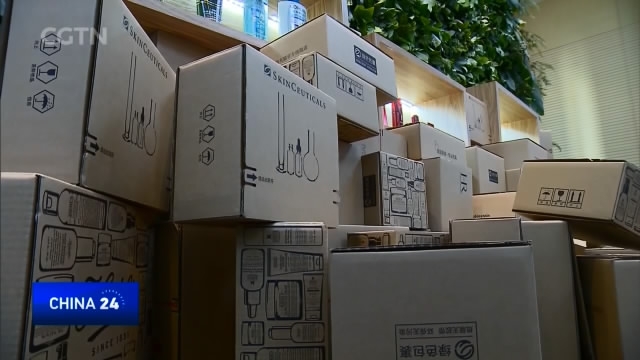
20:58, 23-Feb-2018
China's Growing Consumption: More spending brings more environmental challenges

Personal consumption is a big part of the Chinese economy, it accounted for 59 percent of the country's GDP last year. It also posed serious environmental challenges, such as packaging from food delivery, and online shopping and broken bikes on the roads. All are taking a heavy toll on the environment. Reporter Chen Tong talked to some of the people trying to fix the problem.
When China's online sales volume hit another record in 2017, the number of China's packages made during the year also hit a record -- over 40 billion, a year-on-year increase of about 30 percent. And only 20 percent of those packages are recyclable. The wrapping tape and delivery labels on the packages contribute to the mess as well. L'Oreal is one company trying to tackle the problem. During the Double Eleven shopping day last year, the company used recyclable packages without any tape. The cost of doing it wasn't cheap.
LAURE LEMARQUIS, SUSTAINABILITY DIRECTOR L'OREAL CHINA "In term of cost, it has a negative impact. So it's more expensive. The cost of packaging is around 50 percent more expensive. It's quite significant. We are doing it because we really believe in it. We think more companies will do it, more consumers will also want to participate. They will be more sensitive in these projects. In the end, if more people participate, if the packages are sold in higher volumes. The costs will also decrease."
The company is not the only one to start going green. In 2017, 15 million recyclable packages were delivered nationwide, and billions of electronic labels came into use.
CHEN TONG SHANGHAI "Upgraded consumption is just one factor presenting new challenges to the environment. The sharing economy is also creating problems. So many bikes have invaded the cities that the broken and discarded ones are giving headaches to both local governments and the bike sharing companies themselves. Everyone is working on the problem."
Ofo, for example, has about 2,000 staff in Shanghai who do nothing every day but fix the bikes. The average life cycle of a sharing bike is around two years, but the company has figured out how broken ones can be recycled into new bikes.
MEI JIAQI, GENERAL MANAGER OFO SHANGHAI "For those bikes reaching the end of their life cycle. They will be delivered to the center, and they will be sorted, recycled, and reused for the production raw material. So we have a whole life cycle management, from production to usage to recycling."
As of the end of last July there were 16 million sharing bikes on China's roads, but because of either sabotage or natural damage, plenty have just been dumped by the roadside. City governments are taking on the problem, of course. Shanghai last August banned the companies from putting any additional bikes on the road. From food delivery to the sharing economy, the Chinese government is setting up a variety of principles to combat the new environmental challenges.
PROFESSOR DU HUANZHENG CIRCULAR ECONOMY INSTITUTE, TONGJI UNIVERSITY "Firstly, we should strengthen the promotion of protecting environment to our residents. And the government should also set legislative rules. For example, the State Council launched regulations last year to clarify the responsibilities of garbage producers."
The State Council says producers should take responsibility for the recycling and management of products that reach the end of their life cycle. The government intends that enforcement of the regulations will ensure 40 percent of discarded products will be recycled or properly disposed of by 2020. To back that up, beginning this year there are new taxes on companies which generate pollution.

SITEMAP
Copyright © 2018 CGTN. Beijing ICP prepared NO.16065310-3
Copyright © 2018 CGTN. Beijing ICP prepared NO.16065310-3